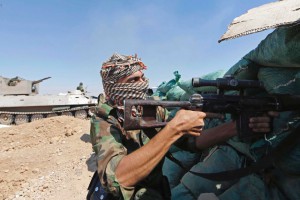An alliance of several jihadi groups unleashed Monday morning a wide-scale offensive against two besieged Shiite towns in Syria in retaliation for a Syrian army attack on a rebel-held Sunni town northwest of the capital Damascus, a monitor group reported.
The attack against the Shiite towns of Foa and Kafraya in the countryside of the northwestern province of Idlib was carried out by the so-called Jaish al-Fateh, or the Conquer Army, an alliance of several jihadi groups, mainly the al-Qaida-linked Nusra Front, according to the Syrian Observatory for Human Rights.
The ultra-radical groups detonated a car bomb after midnight at the entrance of Foa, which was followed by another powerful explosion that rocked the town in the early hours Monday.
The two Shiite towns have been besieged over two months, since Jiash al-Fateh captured much of Idlib province.
The people there have suffered from the lack of medicine and food and become subject to repetitive infiltration attempts by the jihadists, which were rendered flat as the Shiite people there formed a militia to protect the towns.
A video appeared Monday on the internet showing the huge blast that rocked the town of Foa early on Monday, in what was said to be the detonation of a tunnel underneath the town.
The Observatory said many government-loyal fighters were killed, as other activists placed the death toll in the town at 20.
The rebels also posted an online video showing one of their commanders talking about the broad offensive against the two towns.
The bearded commander, wearing camouflage, said the battle to storm the towns is “decisive,” adding that it came after the faltering negotiation attempts with “Iran,” as reported by the rebels that Iran was negotiating with the rebels in Idlib to stay away from the Shiite towns.
The commander also said that the attack on Foa and Kafraya came as a response to the government troops’ attack on the town of Zabadani, northwest of Damascus and near the Lebanese borders.
He said the attack will be halted on the Shiite towns if the Syrian army stopped its attack on Zabadani, which is taken by the al-Qaida-linked Nusra Front, and the Eastern Ghouta countryside east of Damascus.
Last month, rockets fired from the town of Bennish hit the main water tanker in Foa, causing great damages and a loss in large quantities of drinking water that feeds the two towns’ 40,000 inhabitants.
Tens of civilians and fighters there have been wounded and killed and the prices of all commodities have skyrocketed due to the suffocating siege.
The provincial capital of Idlib was the main supply line to the two towns, whose residents have been subject to killing and kidnapping. The image there got dimmer when the jihadist militants captured Idlib last April.
The towns’ men fan out on checkpoints around the two adjacent towns to defend their homes against the reparative threats by the rebels, who kept shelling the towns with assorted rockets and shells.
Locals in the towns say they have a severe shortage in medicine and foodstuffs, warning of a humanitarian catastrophe there.
The Syrian helicopters often airdrop food packs on the towns, but they are not enough, the locals say.
The four-year-old Syrian conflict has taken a sectarian turn with increasing Sunni jihadists are joining the insurgency against the government of President Bsahar al-Assad, who belongs to the Alawite minority, an offshoot of Shiite Islam.
The Lebanese Shiite Hezbollah has joined the battles against the insurgency in Syria to keep the radical rebels away from the Lebanese borders and to protect the Shiite community in Syria, not to mention its main ally; the Syrian administration.



